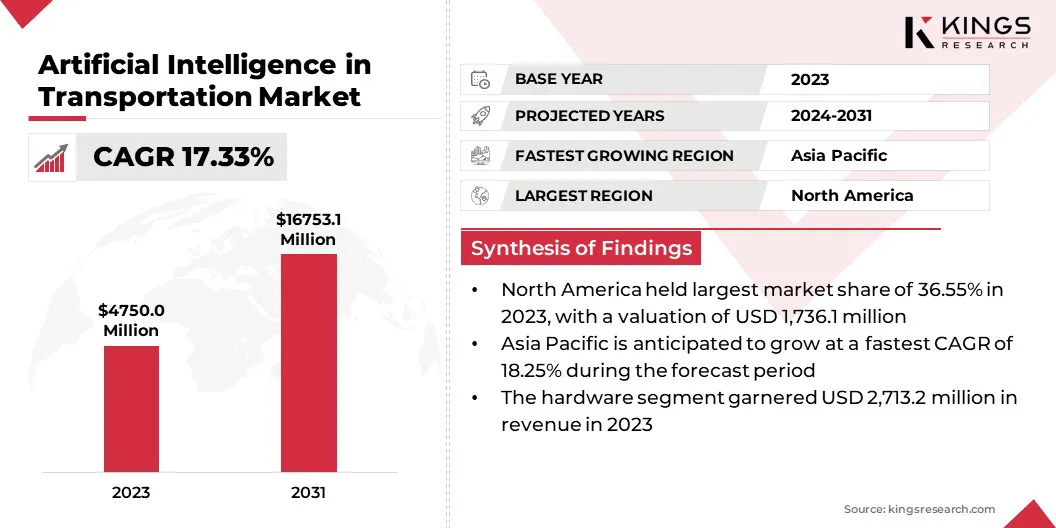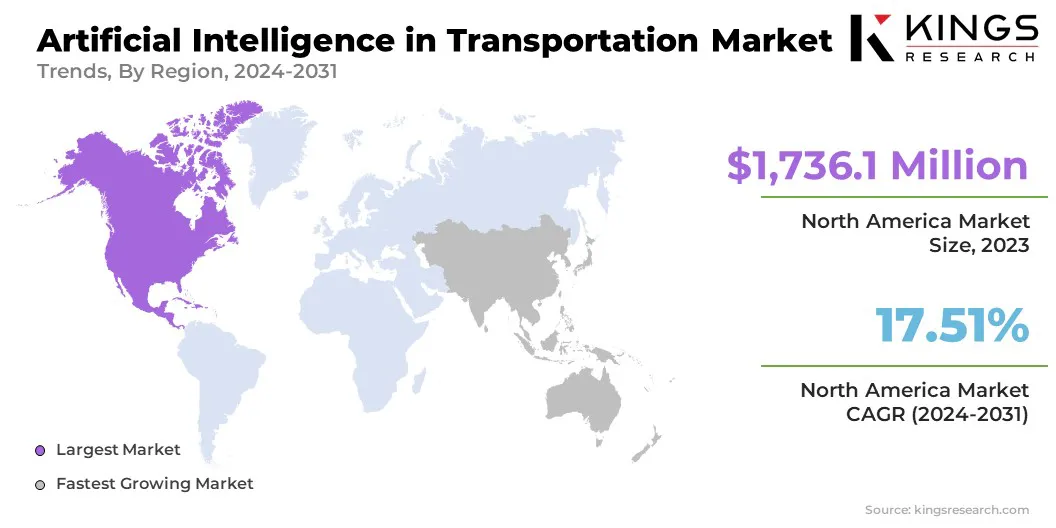Automotive and Transportation

Artificial Intelligence in Transportation Market

Artificial Intelligence in Transportation Market Size, Share, Growth & Industry Analysis, By Offering (Hardware, Software), By Machine Learning Technology (Deep Learning, Computer Vision, Natural Language Processing (NLP), Context Awareness), By Application (Traffic Management, Predictive Maintenance, Others), and Regional Analysis, 2024-2031
Pages : 140
Base Year : 2023
Release : March 2025
Report ID: KR1523
Market Definition
The artificial intelligence in transportation market encompasses the application of AI technologies to improve transportation systems and services. This includes autonomous vehicles, traffic management, route optimization, predictive maintenance, and supply chain logistics. AI enhances efficiency, safety, and sustainability , fostering innovations in autonomous driving, smart infrastructure, and mobility solutions.
Artificial Intelligence in Transportation Market Overview
Global artificial intelligence in transportation market size was USD 4,750.0 million in 2023, which is estimated to be valued at USD 5,474.4 million in 2024 and reach USD 16,753.1 million by 2031, growing at a CAGR of 17.33% from 2024 to 2031.
Market growth is fueled by smart traffic management, as AI optimizes traffic flow, reduces congestion, and enhances safety through real-time data analysis, intelligent signal control, and predictive analytics, improving urban mobility.
Major companies operating in the global artificial intelligence in transportation industry are AB Volvo, Daimler Truck AG., Scania, Continental AG, Robert Bosch GmbH, NVIDIA Corporation, Microsoft, Waymo LLC, Tesla, Zoox, Inc, Pony.ai, Hitachi, Ltd., Alstom SA, Nuro, Inc., EasyMile, and others.
The market is transforming operations by enhancing efficiency, safety, and sustainability. AI is increasingly integrated into autonomous vehicles, traffic management, railways, and logistics to optimize real-time decision-making.
In railways, it improves route planning, predictive maintenance, and train scheduling, reducing delays and enhancing safety. With rapid technological advancements and urbanization, AI is driving smarter, faster, and more sustainable transportation solutions worldwide.
- In September 2024, Alstom launched the ARTE project, introducing automated regional trains powered by AI and sensor technology. This initiative enhances safety, efficiency, and sustainability while advancing driverless rail transportation.

Key Highlights:
- The global artificial intelligence in transportation market size was recorded at USD 4,750.0 million in 2023.
- The market is projected to grow at a CAGR of 17.33% from 2024 to 2031.
- North America held a share of 36.55% in 2023, valued at USD 1,736.1 million.
- The hardware segment garnered USD 2,713.2 million in revenue in 2023.
- The deep learning segment is expected to reach USD 7,533.4 million by 2031.
- The traffic management segment is anticipated to witness the fastest CAGR of 18.13% through the projection period.
- Asia Pacific is anticipated to grow at a CAGR of 18.25% over the forecast period.
Market Driver
"Smart Traffic Management"
Smart traffic management is a major factor stimulating the growth of the artificial intelligence in transportation market as cities strive to optimize traffic flow, reduce congestion, and enhance safety. AI technologies, such as real-time data analysis, adaptive signal control, and predictive traffic modeling, enable efficient management of urban traffic systems.
These innovations improve the overall flow of vehicles, minimize delays, and respond dynamically to incidents, creating safer and more sustainable transportation networks. The growing adoption of smart cities further fuels the demand for AI-driven solutions in traffic management.
- In January 2025, Ouster expanded its lidar-powered BlueCity traffic management solution in Chattanooga, Tennessee, covering over 120 intersections. Utilizing AI and sensor technology, the system optimizes traffic flow, enhances safety, and reduces congestion. This marks the largest lidar-enabled smart traffic network in the U.S., advancing AI-driven transportation infrastructure.
Market Challenge
"Shortage of Skilled Professionals"
A significant challenge impeding the development of the artificial intelligence in transportation market is the shortage of skilled professionals in AI and machine learning, limiting innovation.
To address this, companies can collaborate with universities to foster talent, invest in AI training programs, and promote continuous learning. Additionally, offering competitive salaries, internships, and research partnerships can attract skilled professionals.
Market Trend
"Advancements in Autonomous Vehicles"
Advancements in autonomous vehicles is emerging as a prominent trend influencing the artificial intelligence in transportation market. AI-powered self-driving cars, trucks, and drones enhance safety, efficiency, and reduce operational costs.
These technologies utilize AI for navigation, real-time decision-making, and sensor integration, allowing vehicles to operate independently. As regulatory frameworks evolve and public trust increases, autonomous vehicles are set to revolutionize transportation networks and supply chains.
- In February 2024, Arm and Nuro announced a multi-year partnership to develop AI-driven autonomous technology. Nuro will utilize Arm’s automotive-enhanced technology to scale its Nuro Driver system, enhancing safety and efficiency in autonomous goods delivery and advancing the market.
Artificial Intelligence in Transportation Market Report Snapshot
|
Segmentation |
Details |
|
By Offering |
Hardware, Software |
|
By Machine Learning Technology |
Deep Learning, Computer Vision, Natural Language Processing (NLP), Context Awareness |
|
By Application |
Traffic Management, Predictive Maintenance, Precision and Mapping, Others |
|
By Region |
North America: U.S., Canada, Mexico |
|
Europe: France, UK, Spain, Germany, Italy, Russia, Rest of Europe |
|
|
Asia-Pacific: China, Japan, India, Australia, ASEAN, South Korea, Rest of Asia-Pacific |
|
|
Middle East & Africa: Turkey, UAE, Saudi Arabia, South Africa, Rest of Middle East & Africa |
|
|
South America: Brazil, Argentina, Rest of South America |
Market Segmentation
- By Offering (Hardware and Software): The hardware segment earned USD 2,713.2 million in 2023 due to increasing demand for advanced AI sensors and computing systems in transportation.
- By Machine Learning Technology (Deep Learning, Computer Vision, Natural Language Processing (NLP), and Context Awareness): The deep learning segment held a share of 41.40% in 2023, attributed to its advanced data processing capabilities and role in autonomous vehicle functionality.
- By Application (Traffic Management, Predictive Maintenance, Precision and Mapping, and Others): The traffic management segment is projected to reach USD 7,313.9 million by 2031, owing to rising demand for AI-powered smart traffic solutions and urban mobility optimization.
Artificial Intelligence in Transportation Market Regional Analysis
Based on region, the global market has been classified into North America, Europe, Asia Pacific, Middle East & Africa, and Latin America.

North America artificial intelligence in transportation market share stood at around 36.55% in 2023, valued at USD 1,736.1 million. This dominance is reinforced by its advanced infrastructure, high adoption of autonomous vehicles, and significant investments in AI technology.
The presence of leading companies, such as Tesla, NVIDIA, and Waymo, continue to drive innovations in AI-powered solutions for traffic management, autonomous driving, and predictive maintenance. Strong government support and a growing demand for smart transportation solutions supports regional market expansion.
- In October 2024, Volvo Trucks North America introduced significant enhancements to its Blue Service Contract, designed to maximize fleet uptime. Powered by proprietary artificial intelligence (AI) models, the new adaptive maintenance system leverages AI to adjust service intervals based on truck performance, reducing downtime and operating costs while increasing efficiency for customers.
Asia Pacific artificial intelligence in transportation industry is likely to grow at a robust CAGR of 18.25% over the forecast period. This growth is propelled by continual technological advancements, rapid urbanization, and rising demand for smart mobility solutions.
Countries such as China, Japan, and India are investing heavily in autonomous vehicles, AI-based traffic management systems, and electric vehicles. Additionally, the region’s large population and rapidly growing cities create a strong demand for AI-powered transportation solutions, supporting domestic market development.
- In February 2024, Pony AI launched paid robotaxi services in China, connecting Guangzhou’s city center with key transportation hubs, including Baiyun International Airport and South Railway Station. This expansion demonstrates significant progress in integrating autonomous mobility into urban transportation across China.
Regulatory Frameworks
- The U.S., Department of Transportation’s National Highway Traffic Safety Administration (NHTSA) has proposed the ADS-equipped Vehicle Safety, Transparency, and Evaluation Program, known as AV STEP, to improve transparency and safety in automated driving systems. This initiative promotes voluntary evaluation and oversight of ADS-equipped vehicles on public roads.
- The EU General Data Protection Regulation (GDPR) governs the collection, processing, and transfer of personal data for individuals within the EU.
Competitive Landscape
Companies operating in the artificial intelligence in transportation market are forming collaborations to promote the sustainable use of AI by focusing on reducing emissions, optimizing traffic flow, and enhancing energy efficiency.
These partnerships aim to integrate AI technologies with environmentally-friendly solutions, fostering innovations to reduce carbon footprints, improve fleet management, enhance customer experience, and advance safer, more efficient transportation systems globally.
- In December 2024, Scania partnered with OpenAI to integrate AI, particularly ChatGPT Enterprise, to foster innovation and sustainability in transport. This collaboration aims to enhance employee productivity, improve customer experiences, and drive advancements in sustainable transport solutions using AI-driven technologies across operations.
List of Key Companies in Artificial Intelligence in Transportation Market:
- AB Volvo
- Daimler Truck AG.
- Scania
- Continental AG
- Robert Bosch GmbH
- NVIDIA Corporation
- Microsoft
- Waymo LLC
- Tesla
- Zoox, Inc
- Pony.ai
- Hitachi, Ltd.
- Alstom SA
- Nuro, Inc.
- EasyMile
Recent Developments (Partnerships)
- In April 2023, Continental and Aurora formed an exclusive partnership to develop the first commercially scalable generation of Aurora’s integrated hardware and software system, the Aurora Driver. This collaboration aims to enhance safety, efficiency, and cost-effectivenss, with the first production expected in 2027, .
- In January 2025, Toyota, Aurora, and Continental joined NVIDIA to develop next-generation autonomous vehicle fleets. Leveraging NVIDIA's DRIVE AGX platform, they aim to advance highly automated and driverless trucks, improving safety, efficiency, and scalability.
- In July 2024, Microsoft Azure OpenAI Service drove AI innovations in the transportation sector, with companies such as TomTom, CarMax, Fraport, and Alstom integrating Azure OpenAI to enhance operational efficiency, automate tasks, and enhance customer experiences.
- In March 2024, NVIDIA's DRIVE Thor platform, powered by Blackwell architecture, was adopted by companies such asBYD, Hyper, and Nuro to enable advanced AI-driven capabilities in autonomous vehicles, including cars, trucks, robotaxis, and delivery vehicles.
CHOOSE LICENCE TYPE
CUSTOMIZATION OFFERED
Additional Company Profiles
Additional Countries
Cross Segment Analysis
Regional Market Dynamics
Country-Level Trend Analysis
Competitive Landscape Customization
Extended Forecast Years
Historical Data Up to 5 Years
